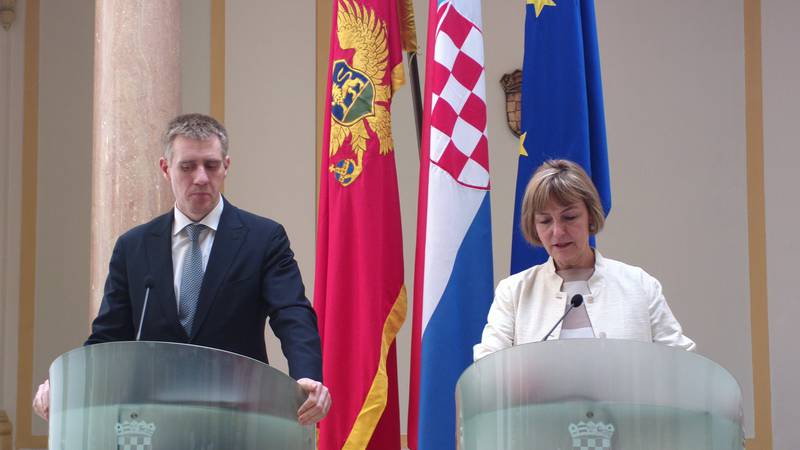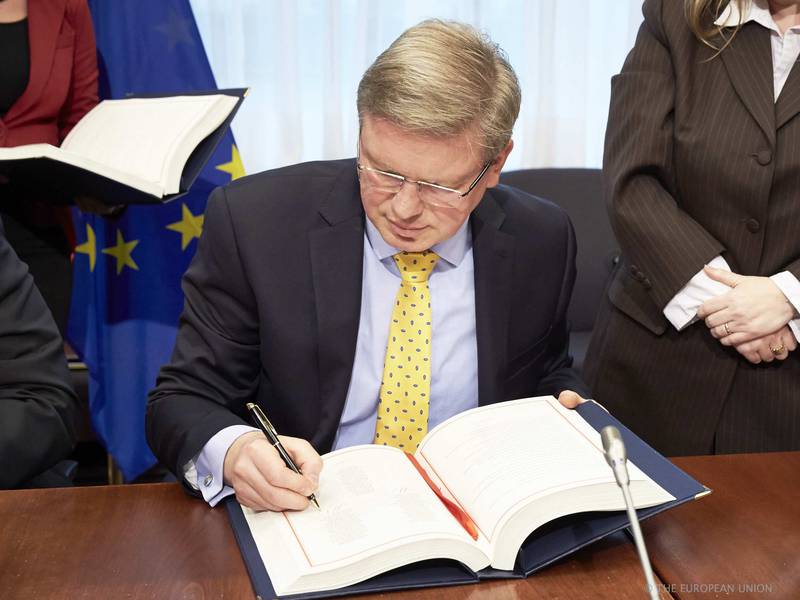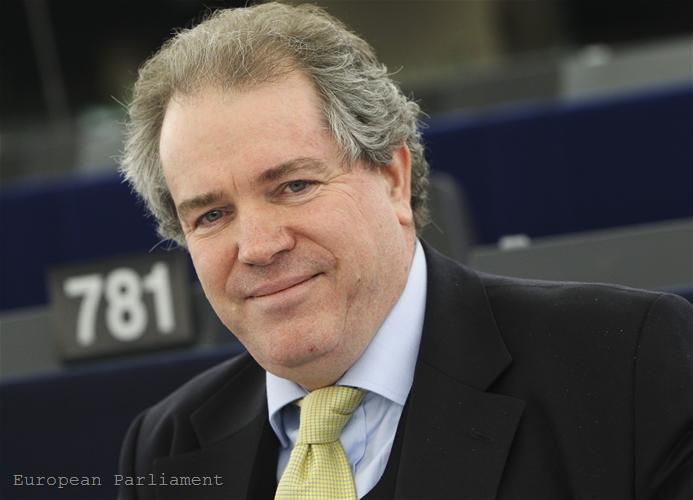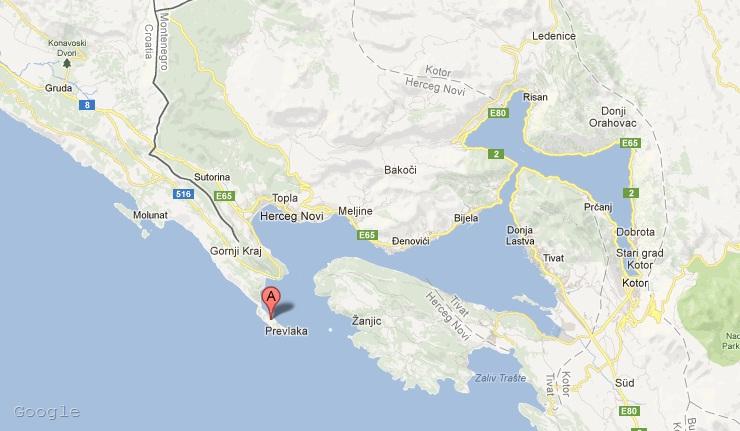Igor Luksic: Security of Journalists in Montenegro Is a Priority
Adelina Marini, March 22, 2014
Montenegro is one of the countries where the media environment is quite worrying. This is clear from the European Commission's report on the tiny Balkan country's progress in the accession negotiations with the EU. The report pays special attention on media. Montenegro is one of the countries where attacks against journalists or media property are not rare. The freshest example with a bomb under the office of the Montenegrin newspaper Vijesti is from the end of last year. That is why, the European Commission has been calling in every report the authorities in Podgorica to work more actively to investigate and prosecute the attacks against journalists. In 2013, Montenegro has scored "limited" progress in this area, the report says.
According to Igor Luksic, the country's deputy prime minister and minister of foreign affairs, however, ensuring the security of journalists and media property is one of the priorities of the Montenegrin government. During his visit in Zagreb on March 20th, Mr Luksic said, responding to a question by euinside, that there already are convictions for some of the attacks for which the investigation has ended and that there even is a prison sentence. As part of its action plan to solve the issues raised by the European Commission is also the establishment of a special commission which consists of media representatives and state officials and which collects facts and circumstances that will help cast light over all attacks.
Igor Luksic assured that in Montenegro there are no hurdles for free information and there even is no such type of auto-censorship which is typical for the countries where the level of media freedom is low. The Commission, however, does not share that opinion. In its report from October 2013, it points out that Montenegrin authorities themselves violate the law on media which forbids the state to found print media. Also worrying is the fact that, often, print media get support from the government in the form of state advertisement. The issue of media independence in the countries from the Western Balkans, especially in the context of their progress toward fullty fledged EU membership, was touched in the European Parliament as well, where last autumn was discussed a report by the European University Institute in Florence which has proposed the idea media environment in the region to be exported into a separate chapter in the accession negotiations.
The issue of reforms in the candidate countries should be even hotter in the context of the rapidly deteriorating relations between the EU and Russia because some of them (Serbia and Montenegro) have traditionally close political and economic relations with Russia. It is not to be excluded that at some point these countries could emerge at crossroads and to be forced to choose sides. Some hesitation on the issue was tangible in Igor Luksic's answer to the Al Jazeera Balkans' question how will Montenegro react to the developments given that it is negotiating for EU membership. "Montenegro, in any case, is not among the countries that will dominate in defining the way this very serious crisis will be resolved", Montenegro's deputy prime minister attempted to escape, adding that already tangible are the negative consequences from the deterioration of the EU-Russia relations.
"Montenegro is not only a candidate country, but it is negotiating for EU membership and that is why it is obliged to adhere to the EU conclusions on Russia", Mr Luksic said and underscored that his country wanted to become a fully fledged member of the Union. In the same time, however, it is the country's national interest a de-escalation to be achieved as soon as possible and the economic relations to continue through dialogue and international cooperation, the Montenegrin deputy prime  minister added. Montenegro will consider the EU sanctions on a case by case basis, but will adhere to the EU position, is the opinion Igor Luksic outlined.
minister added. Montenegro will consider the EU sanctions on a case by case basis, but will adhere to the EU position, is the opinion Igor Luksic outlined.
According to Dejan Jovic, chief political analyst with the president of Croatia and a professor in international relations in the University of Zagreb, the Ukrainian crisis will have significant consequences for the future of the European periphery which will more and more turn into "an arena for competing forces". The creation of a new bipolar or multipolar structure of the European neighbourhood policy could force the candidate countries to reconsider their positions. Until recently, the EU membership had no alternative to all the former Soviet satellites, but now there is, Mr Jovic writes for the Balkans in Europe Policy Blog. That is why, it is time the EU to reconsider its enlargement policy and instead of tightening the accession criteria to soften them, the analyst proposes because, in his words, neither Bosnia and Herzegovina nor Macedonia or even Serbia will be able to reach the standards of Finland ot Sweden before becoming members.
These countries have very specific problems for many reasons, among which the consequences from the war, identity problems, multiethnic composition. A more tailor-made approach to their accession to the EU would facilitate their integration. "This is necessary more than ever", Mr Jovic writes. And if Montenegro is tiny and considers itself incapable to have a dominating role in the resolution of geopolitical problems, the case of Serbia is different. It is important to note that during his victory speech in the election night on March 16th, the future prime minister of Serbia, Alexander Vucic, said that Belgrade will continue on its European path, but will work together with its friends like Russians, Americans, Chinese, etc. This is not a position that should be ignored, especially bearing in mind that a high representative of Russian President Putin was in Belgrade before the early elections were scheduled. In an interview with the Croatian weekly Globus, Mr Vucic admitted that one of the issues discussed during the visit were precisely the elections from the point of view of the Russian strategic interests in the country not to be harmed.
You are probably asking yourselves how come we started with the media situation in tiny Montenegro and ended up with geopolitical conclusions? In fact, the link is more than obvious, especially against the backdrop of the propaganda war Russia waged before it annexed Crimea. A propaganda war along the axis EU-Russia has been taking place for almost a year in Bulgaria which has been a member of the EU for seven years and the protests against the government are still ongoing. So, if the EU decided to listen to Dejan Jovic's advise and drew a special programme to integrate the Western Balkan countries in the EU, special focus should be put on media freedom.
 Stefan Fule | © Council of the EU
Stefan Fule | © Council of the EU | © European Parliament
| © European Parliament | © Google
| © Google